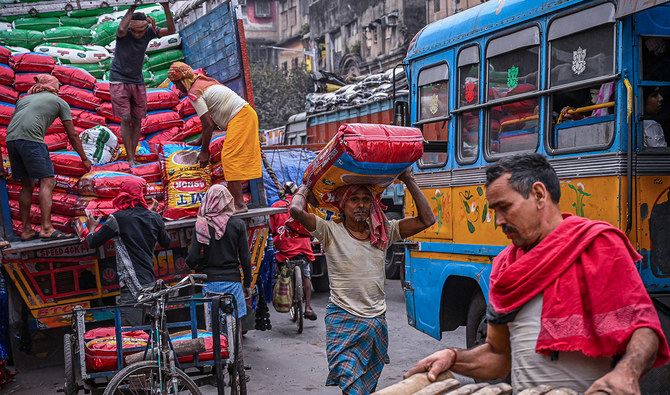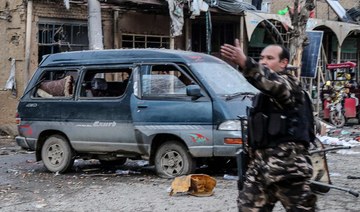NEW DELHI: South Asia is expected to grow by 5.8 percent this year, making it the fastest-growing region in the world even as the pace remains below pre-pandemic levels, the World Bank said on Tuesday.
The latest South Asia Development Update from the World Bank projected growth in the region to slow slightly to 5.6 percent in 2024 and 2025, as post-pandemic rebounds fade and reduced global demand weighs on economic activity.
At almost 6 percent this year, the region is growing faster than all other emerging markets, said Franziska Ohnsorge, the organization’s chief economist for South Asia.
“While high inflation and interest rates have bogged down many emerging markets, South Asia seems to be forging ahead,” the World Bank noted in its report.
Still, “for all of the countries here this represents a slowdown from pre-pandemic levels,” Ohnsorge said, adding that the growth wasn’t fast enough to meet various development goals set by countries in the region.
Despite the progress, the region still has a long way to go, the report said. Per capita incomes in South Asia are around $2,000 — one-fifth of the level in East Asia and the Pacific region. The current growth rates, while high, are not sufficient for South Asian nations to achieve high-income status within a generation, it said. Additionally, the growth is not necessarily equal.
India, which accounts for most of the regional economy, is set to remain robust with 6.3 percent growth in the 2023-24 fiscal year, while others like Maldives and Nepal are also expected to grow thanks to a rebound in tourism.
But things are bleaker in other countries. Bangladesh’s growth may slow to 5.6 percent, while projections for Pakistan’s growth — only 1.7 percent — are below the rate of its population growth, the World Bank said. Sri Lanka, whose economy collapsed last year, is recovering slowly from a severe recession, but the IMF last week held off from releasing a second tranche of a funding package after concluding that the country had failed to make enough progress in economic reforms.
The World Bank said another concern was that government debt in South Asian countries averaged 86 percent of GDP in 2022, which is higher than other emerging markets. It added the high debt could increase the risk of defaults and raise borrowing costs.
The region’s economic outlook could also be affected by the slowdown in China’s economy and is vulnerable to further shocks from natural disasters, which have become more frequent and intense due to climate change, the report said.
Ohnsorge said that governments in South Asia could improve fiscal conditions by seizing on opportunities for energy transition, which could create jobs, reduce reliance on energy imports and cut pollution levels.
“Almost one-tenth of the region’s workers are employed in pollution-intensive jobs,” many of which are concentrated among informal and lower-skilled workers who are more vulnerable to changes in the labor market, the World Bank said. The region currently lags behind others in adopting energy-efficient technologies and creating more green jobs, Ohnsorge added.
The World Bank on Tuesday also released its latest India Development Update, which found that despite a challenging global economic environment, India was one of the fastest-growing major economies in the previous fiscal year at 7.2 percent. This put it as the second highest among the Group of 20 countries and was almost twice the average for emerging market economies, it said.
With global challenges expected to continue on the back of high interest rates, geopolitical tensions and sluggish global demand, overall economic growth is likely to slow in the medium-term. The World Bank forecasts India’s GDP growth for the current fiscal year to be 6.3 percent, attributing it mainly to external factors and waning pent-up demand after the COVID-19 pandemic.
South Asia expected to grow by nearly 6 percent this year, making it world’s fastest-growing region
https://arab.news/92dmm
South Asia expected to grow by nearly 6 percent this year, making it world’s fastest-growing region

- Per capita incomes in South Asia are around $2,000 — one-fifth of the level in East Asia and the Pacific region
- India, which accounts for most of the regional economy, is set to grow by 6.3 percent in the 2023-24 fiscal year
Afghan returnees in Bamiyan struggle despite new homes

- More than five million Afghans have returned home since September 2023, according to the International Organization for Migration
BAMIYAN, Afghanistan: Sitting in his modest home beneath snow-dusted hills in Afghanistan’s Bamiyan province, Nimatullah Rahesh expressed relief to have found somewhere to “live peacefully” after months of uncertainty.
Rahesh is one of millions of Afghans pushed out of Iran and Pakistan, but despite being given a brand new home in his native country, he and many of his recently returned compatriots are lacking even basic services.
“We no longer have the end-of-month stress about the rent,” he said after getting his house, which was financed by the UN refugee agency on land provided by the Taliban authorities.
Originally from a poor and mountainous district of Bamiyan, Rahesh worked for five years in construction in Iran, where his wife Marzia was a seamstress.
“The Iranians forced us to leave” in 2024 by “refusing to admit our son to school and asking us to pay an impossible sum to extend our documents,” he said.
More than five million Afghans have returned home since September 2023, according to the International Organization for Migration (IOM), as neighboring Iran and Pakistan stepped up deportations.
The Rahesh family is among 30 to be given a 50-square-meter (540-square-foot) home in Bamiyan, with each household in the nascent community participating in the construction and being paid by UNHCR for their work.
The families, most of whom had lived in Iran, own the building and the land.
“That was crucial for us, because property rights give these people security,” said the UNHCR’s Amaia Lezertua.
Waiting for water
Despite the homes lacking running water and being far from shops, schools or hospitals, new resident Arefa Ibrahimi said she was happy “because this house is mine, even if all the basic facilities aren’t there.”
Ibrahimi, whose four children huddled around the stove in her spartan living room, is one of 10 single mothers living in the new community.
The 45-year-old said she feared ending up on the street after her husband left her.
She showed AFP journalists her two just-finished rooms and an empty hallway with a counter intended to serve as a kitchen.
“But there’s no bathroom,” she said. These new houses have only basic outdoor toilets, too small to add even a simple shower.
Ajay Singh, the UNHCR project manager, said the home design came from the local authorities, and families could build a bathroom themselves.
There is currently no piped water nor wells in the area, which is dubbed “the dry slope” (Jar-e-Khushk).
Ten liters of drinking water bought when a tanker truck passes every three days costs more than in the capital Kabul, residents said.
Fazil Omar Rahmani, the provincial head of the Ministry of Refugees and Repatriation Affairs, said there were plans to expand the water supply network.
“But for now these families must secure their own supply,” he said.
Two hours on foot
The plots allocated by the government for the new neighborhood lie far from Bamiyan city, which is home to more than 70,000 people.
The city grabbed international attention in 2001, when the Sunni Pashtun Taliban authorities destroyed two large Buddha statues cherished by the predominantly Shia Hazara community in the region.
Since the Taliban government came back to power in 2021, around 7,000 Afghans have returned to Bamiyan according to Rahmani.
The new project provides housing for 174 of them. At its inauguration, resident Rahesh stood before his new neighbors and addressed their supporters.
“Thank you for the homes, we are grateful, but please don’t forget us for water, a school, clinics, the mobile network,” which is currently nonexistent, he said.
Rahmani, the ministry official, insisted there were plans to build schools and clinics.
“There is a direct order from our supreme leader,” Hibatullah Akhundzada, he said, without specifying when these projects will start.
In the meantime, to get to work at the market, Rahesh must walk for two hours along a rutted dirt road between barren mountains before he can catch a ride.
Only 11 percent of adults found full-time work after returning to Afghanistan, according to an IOM survey.
Ibrahimi, meanwhile, is contending with a four-kilometer (2.5-mile) walk to the nearest school when the winter break ends.
“I will have to wake my children very early, in the cold. I am worried,” she said.












